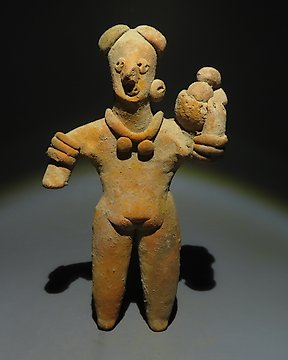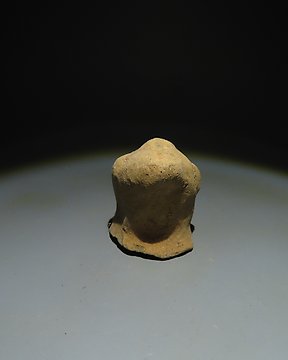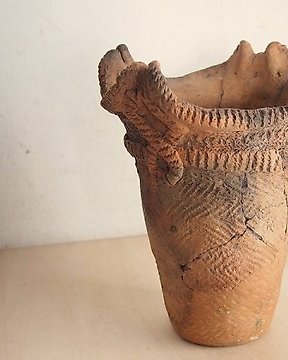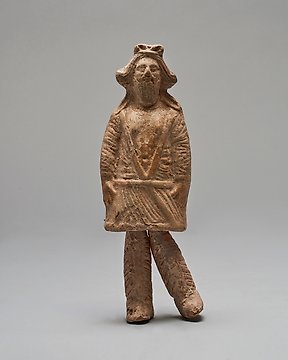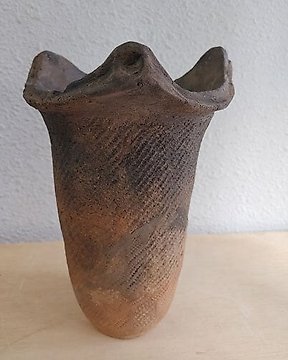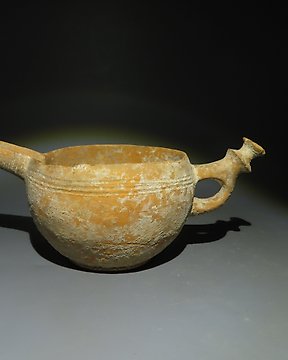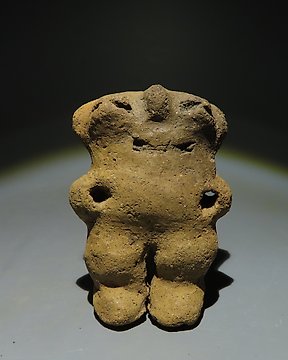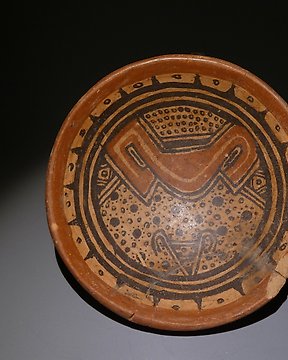ik ben heel blij met de door jullie verkochte prachtige thangka
查看翻译Ancient Chinese, Tang Dynasty Terracotta 彩绘陶器胖夫人雕像, - 21 cm
编号 85401021

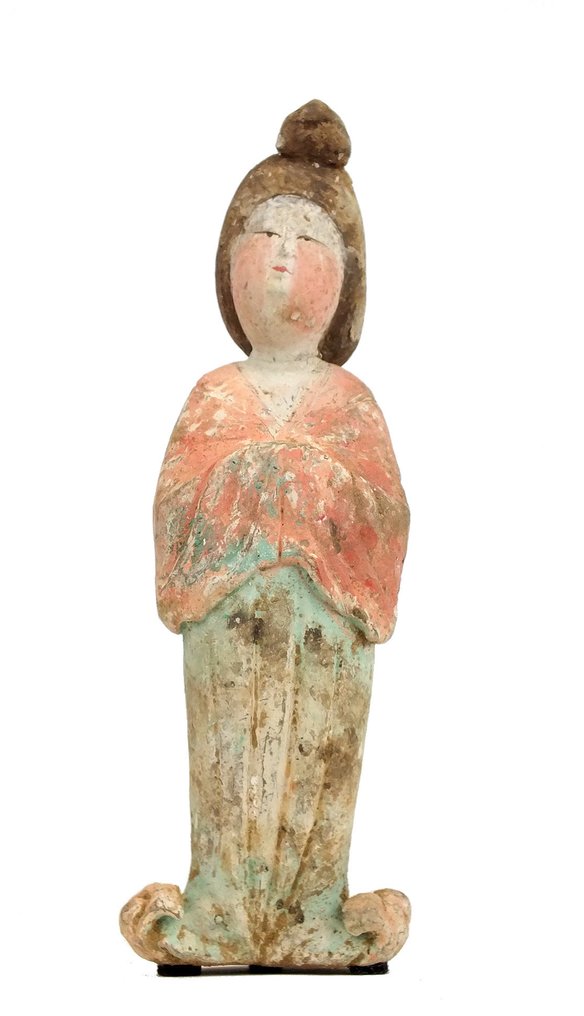
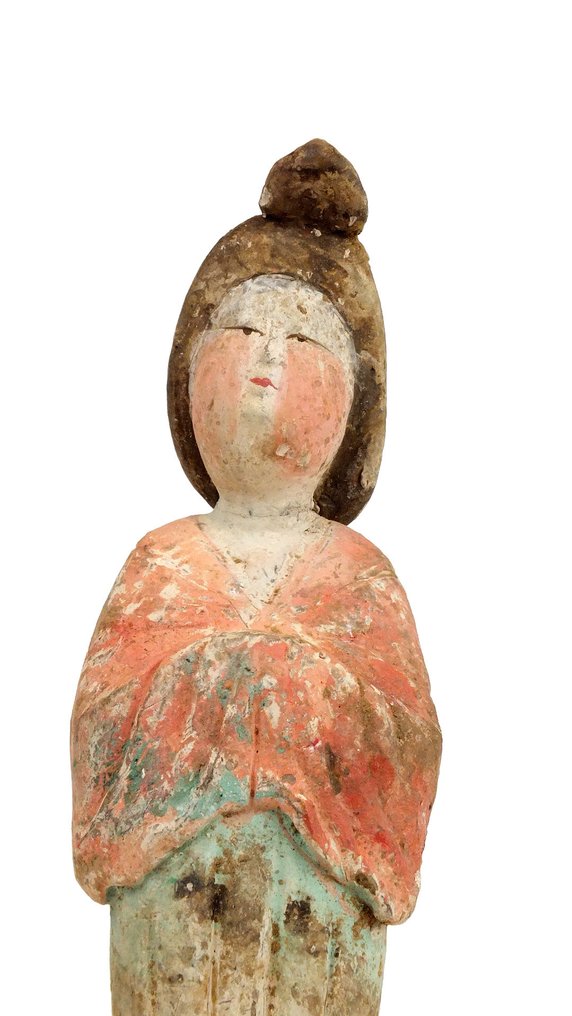
Tang Dynasty (618-907), Xián, Shaanxi province, China
Note: It will be professionally packed and safely send in a wooden crate within 3 working days by FedEx. Shipped with Insurance!
High 21 cm.
Very good condition.
Our Guarantee: The above item is guaranteed to be of the time period and condition as described, has been exported legally and is legal to buy and sell under all international lows to cultural patrimony.
- Provenance:
Very important and old private collection, since 2002.
Well modelled standing with body swayed on the left site and head turned to the site, the ends of her long sleeves hanging gracefully from her hands in front of her corpulent body. Heavy robes falling in deep folds on her shoes painted with pale red and red floral sprays and florets arranged in patterns on the pule green and red ground. The lady with a pule green scarf draped over the shoulders that trails down her back where the robes flare out gracefully atop the base. Her full face modelled with delicate features framed by stiff wings of her coiffure to one side, traces of original red, black pigment.
The elegant figure exemplifies the court ladies that became fashionable in the second half of the Tang dynasty. Figures of similar style were excavated from the tomb of Wu Shouzhong, who was buried near the Tang capital, Xi’an, Shaanxi province, in 748 A.D. See the Quest for Eternity, Los Angeles Country Museum, 1987, nos. 83 and 84. Although the models of court ladies made in the early part of the Tang dynasty depict them wearing tight-fitting garments, which accentuated their slender forms, the reign of the Emperor Ming Huang seems to have heralded the growing in popularity of a more generous female form and the adoption of less structured, more flowing robes. This change in style has traditionally been attributed to the influence of the emperor’s adored concubine Yang Guifei, who was reported to have had a rather voluptuous figure. However, excavated figures suggest that the fashion for more voluptuous figures was already coming to prominence by the time that Yang Guifei won the emperor’s admiration.
The figures of this type usually hold their hands in front of them, in order to provide a more graceful arrangement of their sleeves, as can been seen in the present court lady.
- A Certificate of Authenticity from Becker Antiques (specialist in Chinese pottery since 1969, Amsterdam) will accompany the item.
- All items legal to buy/sell under The Netherlands covering cultural patrimony and are guaranteed to be as described or your money back.
Additional Information:
Tang Dynasty
National unification during the Tang dynasty brought about centuries of social stability and economic prosperity. Ceramic art evolved further towards maturity and important kiln centres emerge across the country.
The repertoire of mortuary objects in Tang tombs closely followed those of earlier periods. The majority was still made of pottery clay and came in many forms and styles, which illustrate the evolution and traits of Tang ceramic art. These objects can broadly be divided into five categories namely tomb guardians, guards of honour, attendants, animals, and utilitarian wares.
Tang dynasty tomb figures are pottery figures of people and animals made in the Tang dynasty of China (618–906) as grave goods to be placed in tombs. There was a belief that the figures represented would become available for the service of the deceased in the afterlife. The figures are made of moulded earthenware with colour generally being added, though often not over the whole figure, or in naturalistic places. Where the colouring was in paint it has often not survived, but in many cases, it was in sancai ("three-colour") ceramic glaze, which has generally lasted well.
The figures, called mingqui in Chinese, were most often of servants, soldiers (in male tombs) and attendants such as dancers and musicians, with many no doubt representing courtesans. In burials of people of high rank there may be soldiers and officials as well. The animals are most often horses, but there are surprising numbers of both Bactrian camels and their Central Asian drivers, distinguished by thick beards and hair, and their facial features. The depictions are realistic to a degree unprecedented in Chinese art, and the figures give archaeologists much useful information about life under the Tang. There are also figures of the imaginary monster "earth spirits" and the fearsome human Lokapala (or tian wang), both usually in pairs and acting as tomb guardians to repel attacks by both spirits and humans. Sets of the twelve imaginary beasts of the Chinese Zodiac are also found, usually unglazed.
The most common animals, and the most likely to be large and carefully modelled and decorated, are horses and camels. Both sorts range from animals without harness and saddlery to those with elaborately detailed trappings, and carrying riders or, in the case of camels, heavy loads of goods.
The graceful ladies with plump faces and bodies (so called Fat ladies), the smartly dressed civil officials, the mighty warriors, the horses with saddles and accessories, as well as camels and non - Chinese figurines are all results of the potter’s keen observation and superb virtuosity. They allow us to visualise life in China more than a millennium ago.
Condition: Very good condition. Wear consistent with the age, some loss of color, the neck has been re-glue. Please be advised that all ancient Chinese pottery objects had been buried in tombs and are excavated from there. Therefore, they can always have some restorations. Also worth of note is that the item is more than 1200 years old.
Important information.
The seller guarantees that he is entitled to ship this lot.
It will be professionally packed and safely send in a wooden crate by FedEx.
Buyers are responsible for import regulation and restrictions of their own country
卖家故事
Tang Dynasty (618-907), Xián, Shaanxi province, China
Note: It will be professionally packed and safely send in a wooden crate within 3 working days by FedEx. Shipped with Insurance!
High 21 cm.
Very good condition.
Our Guarantee: The above item is guaranteed to be of the time period and condition as described, has been exported legally and is legal to buy and sell under all international lows to cultural patrimony.
- Provenance:
Very important and old private collection, since 2002.
Well modelled standing with body swayed on the left site and head turned to the site, the ends of her long sleeves hanging gracefully from her hands in front of her corpulent body. Heavy robes falling in deep folds on her shoes painted with pale red and red floral sprays and florets arranged in patterns on the pule green and red ground. The lady with a pule green scarf draped over the shoulders that trails down her back where the robes flare out gracefully atop the base. Her full face modelled with delicate features framed by stiff wings of her coiffure to one side, traces of original red, black pigment.
The elegant figure exemplifies the court ladies that became fashionable in the second half of the Tang dynasty. Figures of similar style were excavated from the tomb of Wu Shouzhong, who was buried near the Tang capital, Xi’an, Shaanxi province, in 748 A.D. See the Quest for Eternity, Los Angeles Country Museum, 1987, nos. 83 and 84. Although the models of court ladies made in the early part of the Tang dynasty depict them wearing tight-fitting garments, which accentuated their slender forms, the reign of the Emperor Ming Huang seems to have heralded the growing in popularity of a more generous female form and the adoption of less structured, more flowing robes. This change in style has traditionally been attributed to the influence of the emperor’s adored concubine Yang Guifei, who was reported to have had a rather voluptuous figure. However, excavated figures suggest that the fashion for more voluptuous figures was already coming to prominence by the time that Yang Guifei won the emperor’s admiration.
The figures of this type usually hold their hands in front of them, in order to provide a more graceful arrangement of their sleeves, as can been seen in the present court lady.
- A Certificate of Authenticity from Becker Antiques (specialist in Chinese pottery since 1969, Amsterdam) will accompany the item.
- All items legal to buy/sell under The Netherlands covering cultural patrimony and are guaranteed to be as described or your money back.
Additional Information:
Tang Dynasty
National unification during the Tang dynasty brought about centuries of social stability and economic prosperity. Ceramic art evolved further towards maturity and important kiln centres emerge across the country.
The repertoire of mortuary objects in Tang tombs closely followed those of earlier periods. The majority was still made of pottery clay and came in many forms and styles, which illustrate the evolution and traits of Tang ceramic art. These objects can broadly be divided into five categories namely tomb guardians, guards of honour, attendants, animals, and utilitarian wares.
Tang dynasty tomb figures are pottery figures of people and animals made in the Tang dynasty of China (618–906) as grave goods to be placed in tombs. There was a belief that the figures represented would become available for the service of the deceased in the afterlife. The figures are made of moulded earthenware with colour generally being added, though often not over the whole figure, or in naturalistic places. Where the colouring was in paint it has often not survived, but in many cases, it was in sancai ("three-colour") ceramic glaze, which has generally lasted well.
The figures, called mingqui in Chinese, were most often of servants, soldiers (in male tombs) and attendants such as dancers and musicians, with many no doubt representing courtesans. In burials of people of high rank there may be soldiers and officials as well. The animals are most often horses, but there are surprising numbers of both Bactrian camels and their Central Asian drivers, distinguished by thick beards and hair, and their facial features. The depictions are realistic to a degree unprecedented in Chinese art, and the figures give archaeologists much useful information about life under the Tang. There are also figures of the imaginary monster "earth spirits" and the fearsome human Lokapala (or tian wang), both usually in pairs and acting as tomb guardians to repel attacks by both spirits and humans. Sets of the twelve imaginary beasts of the Chinese Zodiac are also found, usually unglazed.
The most common animals, and the most likely to be large and carefully modelled and decorated, are horses and camels. Both sorts range from animals without harness and saddlery to those with elaborately detailed trappings, and carrying riders or, in the case of camels, heavy loads of goods.
The graceful ladies with plump faces and bodies (so called Fat ladies), the smartly dressed civil officials, the mighty warriors, the horses with saddles and accessories, as well as camels and non - Chinese figurines are all results of the potter’s keen observation and superb virtuosity. They allow us to visualise life in China more than a millennium ago.
Condition: Very good condition. Wear consistent with the age, some loss of color, the neck has been re-glue. Please be advised that all ancient Chinese pottery objects had been buried in tombs and are excavated from there. Therefore, they can always have some restorations. Also worth of note is that the item is more than 1200 years old.
Important information.
The seller guarantees that he is entitled to ship this lot.
It will be professionally packed and safely send in a wooden crate by FedEx.
Buyers are responsible for import regulation and restrictions of their own country
卖家故事
- 49
- 0
- 0
Flawless transaction; friendly, good service. Many thanks!
查看翻译Bel art ! Bien reçu , merci pour tout. Heureux de pouvoir la contempler.
查看翻译Ben zeer content van de verzending en het beeldje is in zeer correcte staat.
查看翻译Delivered in very safe package
查看翻译De verzending is correct verlopen.
查看翻译Die Anlieferung hat gut und sicher geklappt. Ich bin sehr froh, die Skulptur jetzt in meinen Händen zu halten. Sie passt sehr gut in meine Sammlung ähnlicher Artefakte und ist für mich sehr schön.
查看翻译conforme merci ++++
查看翻译Erg goed verpakt. Prachtige vaas.
查看翻译Vriendelijke meneer verpakte het object in een ruime doos voorzien van schuimplastic en bolletjesplastic. Hij bracht de doos naar de auto. Het object zelf maakte ons blij en voldeed volledig.
查看翻译Everything as described: the book, delivery. Just one small eco- remark- please use less plastic and paper when packing a book. Thanks!
查看翻译Magnifique, objet livré dans mon appartement. Il est splendide Bravo Becker Antiques
查看翻译Very professionally handled
查看翻译impeccable lot livré dans l'appartement et il est remarquable, avec les certificats Bravo
查看翻译L'antiquaire hollandais qui m'a vendu la très belle paire de chevaux s'est déplacé d'Amsterdam vers la Suisse pour me livrer directement et rapidement mon achat. Il les a transportés soigneusement.
查看翻译bela peça MUITO BEM EMBALADA. Parabéns
查看翻译Très bel objet authentique Envoi très bien protégé et rapide Vendeur sérieux Je donne la note de 10/10 Merci
查看翻译La pieza que adquirí, la recibí rota. El envío no se hizo en el embalaje anunciado en la descripción, pero desde Becker han estado dispuestos a ofrecerme una solución y de forma rápida. Gracias
查看翻译ok merci
查看翻译Très belle maternité Ashanti, envoi rapide et soigné, vendeur sérieux à recommander.
查看翻译a fine object, very careful and fast shipping
查看翻译Excellent object - as described - qualified consulting during pick-up - very friendly .... Peter
查看翻译all perfect, as usual!
查看翻译Parfait merci A la prochaine
查看翻译5* parfait merci
查看翻译免责声明
卖家保证并能证明该物品是合法获取的。 Catawiki 通知卖家,他们必须提供其居住国法律法规所要求的文件。 卖家保证并有权出售/出口此物品。 卖家将向买家提供有关该物品的所有已知的原产地信息。 卖家确保已经/将安排任何必要的许可。 卖家将立即通知买家有关获得此类许可可能产生的任何延误。
卖家保证并能证明该物品是合法获取的。 Catawiki 通知卖家,他们必须提供其居住国法律法规所要求的文件。 卖家保证并有权出售/出口此物品。 卖家将向买家提供有关该物品的所有已知的原产地信息。 卖家确保已经/将安排任何必要的许可。 卖家将立即通知买家有关获得此类许可可能产生的任何延误。
